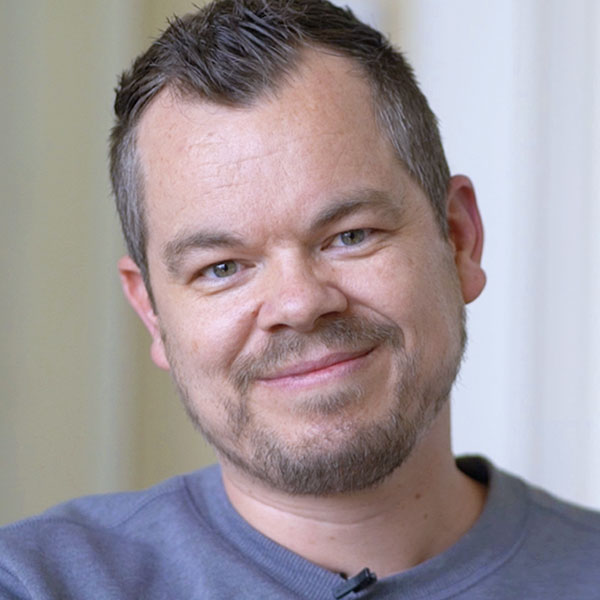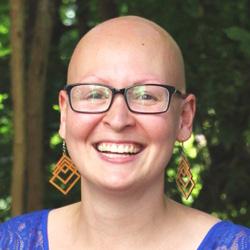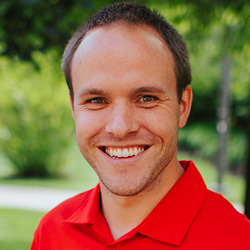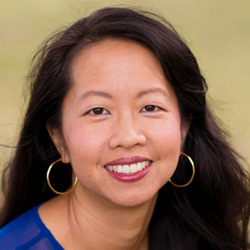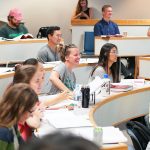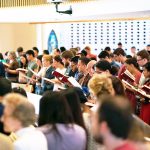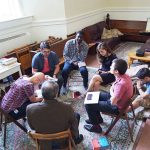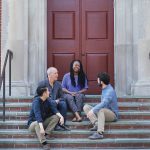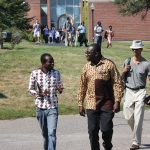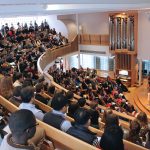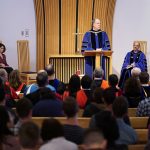PROGRAM OVERVIEW
Master of Divinity (MDiv)
If you feel called to vocational ministry, to nurturing and growing churches locally and internationally, to studying the Bible intensively and sharing the Word of God faithfully, Gordon-Conwell’s MDiv is designed for you. Our comprehensive program provides men and women with rigorous theological training, deep spiritual formation, and practical ministry skills to proclaim the gospel with true servant leadership.
You may be called to serve in your local community or across the globe, and our commitment to global discipleship will prepare you to serve with cultural relevance. You will learn from world-renowned faculty in a diverse community of 85 denominations and 50 languages.
Alumni Experiences
TYPICAL STUDENT
The Master of Divinity generally draws students desiring to enter full-time vocational or bi-vocational ministry. The student body is made up of a diverse group of people from different ethnicities, countries, denominations and phases of life.
Typical Vocations
Pastoral Ministry
Missions
Chaplaincy
Academics
Graduates have also applied their MDiv in the marketplace, public policy, education, research, public service, medicine, dentistry, law, and Hollywood.
Courses
90 Credit Hours (30 Courses)
Course List
Biblical Languages: 4 Courses / 12 Credit Hours
- Hebrew I (OL501)
- Hebrew II (OL502)
- Greek I (GL501)
- Greek II (GL502)
Biblical Studies: 8 Courses / 24 Credit Hours
Old Testament
- Exploring the Old Testament (OT500) 1
- Interpreting the Old Testament (OT511)
- Old Testament Exegesis (OT 600 level)
- Old Testament Exegesis (OT 700 level)
New Testament
- Exploring the New Testament (NT500) 1
- Interpreting the New Testament (NT502)
- New Testament Exegesis: Narrative (NT 611–619)
- New Testament Exegesis: Epistles (NT 620–649)
Christian Thought: 8 Courses / 24 Credit Hours
- The Church to the Reformation (CH501)
- The Church from the Reformation (CH502)
- Theology Survey I (TH501)
- Theology Survey II (TH502)
- Theology Elective (TH any)
- Ethics Course (ET any)
- Understanding Culture (IS/WM520)
- World Missions Course (WM601 or TH/WM602)
Practical Theology: 7 Courses / 21 Credit Hours
- Spiritual Formation course (MC/SF501 or CH/SF591)
- Pastoral Counseling course (PC511 or MC/PC513)
- Preaching: Principles & Practices (PR601)
- Pastoral Communication Course (PR602, PR717, or MC520)
- Pastoral Skills Course (Any CL or EV Course)
- Practical Theology (Any CL, CO, EM, EV, MC, PC, PR, or YM Course)
- Capstone Course: Pastoral Ministry (MC701) or Readiness for Ministry (MC850)
Field Education/Practicum: 3 Credit Hours
- Mentored Ministry Rotation 1
- Mentored Ministry Rotation 2
- Mentored Ministry Rotation 3
General Electives: 2 Courses / 6 Credit Hours
- General Elective
- General Elective
This list is provided for you convenience. It seeks to be accurate and up-to-date but does not replace your graduation check sheet as the authoritative statement of degree requirements per your admission. That check sheet provides a fuller list of alternative courses and potential exceptions.
1. Students who pass the Old Testament or New Testament competency exams may waive the course(s) OT500 or NT501 OR replace these with an open elective. (Bible competency exams must be taken prior to a student’s first course).
2. The following course prefixes are associated with Gordon-Conwell’s three teaching divisions
Biblical Studies includes: GL, NT, OL, OT.
Christian Thought includes: AP, CH, CT, ET, TH, WM
Practical Theology includes: CL, CO, EM, EV, MC, MM, PC, PR, or YM
Program Goals
- Graduates will be spiritually grounded. They will understand who they are as children of God and will be faithful in developing their relationships with Christ and with his people.
- Graduates will be biblically grounded. They will acknowledge the authority of God’s inerrant Bible and its centrality in governing Christian life and practice. They will understand the main themes and emphases of the Old and New Testaments and have a grasp of the overall message of the Bible and its implications for all aspects of life.
- Graduates will be exegetically skilled. They will be adept at using the biblical languages, will grasp the basics of interpretive methodology, and will have practice in using tools and techniques to handle the Bible well.
- Graduates will be historically and theologically adept. They will appreciate the historical and doctrinal heritage both of the Christian church as a whole and of the specific group or groups of which they are a part. They will have significant exposure to historical and theological studies.
- Graduates will be culturally and globally aware. They will recognize the importance of understanding the culture in which one ministers and will possess experience in interpreting their particular ministry context in light of Scripture. They will be aware of what the Lord is doing to establish his kingdom throughout the world and will see their own ministries in direct connection to the worldwide mission of his church. Graduates in some concentrations will have detailed exposure to cultural and global studies.
- Graduates will be equipped with ministry skills. They will be adept at public proclamation of God’s Word, discipling God’s people, and guiding the church’s ministries.
Program Distinctives
- Optional MACO/MDiv dual degree opportunity
- Development of a firm biblical foundation to equip students for effective ministry
- Emphasis on the study of original biblical languages
- World-renowned faculty members training new leaders in the Church
- Access to other top-tier institutions, including Harvard Divinity School and Boston University School of Theology, through the Boston Theological Interreligous Consortium
- Mentored Ministry component provides supervised practical ministry opportunities
- Emphasis on global engagement provides opportunities for hands-on missions experience
- Hamilton Campus
- Hamilton Campus
- Academic courses that equip students with a solid foundation for effective ministry in an urban setting
- Conveniently located in the heart of the city with faculty who are urban ministry practitioners
- Rigorous courses offered during evenings and weekends to accommodate your schedule
- Access to other top-tier institutions, including Harvard Divinity School and Boston University School of Theology, through the Boston Theological Interreligious Consortium
- Field-Based Mentored Ministry component provides supervised practical ministry opportunities and carries course credit
- Emphasis on the study of original biblical languages
- Emphasis on deep spiritual formation, global engagement and practical training
- Quality contextualized theological education and hands-on training
- Rigorous courses offered in various formats (evenings, weekends, week intensives and online/hybrid) to accommodate your schedule
- Renowned, highly qualified and experienced faculty
- Emphasis on the study of original biblical languages
- Enhanced library services with capability to access theological databases from your home
Requirements
Academic Requirements
Required Degree: Bachelor’s
Minimum GPA: 2.5
English Language Requirements
Gordon-Conwell requires a TOEFL score of 90 or better (IBT) for International Students. We also accept IELTS scores of 6.5 or higher, or a Duolingo score of 110. Students who have completed an undergraduate degree through an English-language university may request a TOEFL waiver.
Application Requirements
A Completed Online Application Includes:
- Application Form
- Application Fee
- Two Uploaded Essays
- A 1-2 page personal statement addressing questions about your vocational goals, church involvement, encouragement from others, reasons for applying to Gordon-Conwell, and an assessment of your own strengths and weaknesses
- A 1-2 page autobiographical statement
- Three Recommendations
- Pastor or Church Official with Church Endorsement;
(Your pastoral reference will have an opportunity to provide a church endorsement when completing their pastoral recommendation) - Friend or Associate;
- Former Professor or Professional Colleague (references should be individuals whom you have known for at least one year, and who are not related to you.)
- Pastor or Church Official with Church Endorsement;
- Official Transcripts
- The seminary requires a bachelor’s degree from an institution accredited by a recognized accrediting agency.
- Official transcripts must be sent directly to Gordon-Conwell, or hand-delivered in a sealed envelope. Copies and opened transcripts are not considered official.
- Transcripts may be sent by any means your college(s) uses for transmitting official transcripts; official electronic transcripts are accepted.
- Gordon-Conwell is a partner school of Parchment. If your college uses this service for transmitting electronic transcripts, search for and have the transcripts sent to “Gordon-Conwell Theological Seminary.”
- We do need transcripts from all colleges/universities attended, even if the classes were transferred to another school and are reflected on their transcripts.
Request Information
Learn more about our MDiv program:
